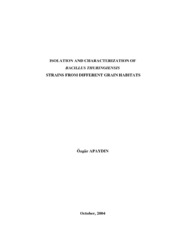Please use this identifier to cite or link to this item:
https://hdl.handle.net/11147/3294| Title: | Isolation and Characterization of Bacillus Thuringiensis Strains From Different Grain Habitats | Authors: | Apaydın, Özgür | Advisors: | Güneş, Hatice | Publisher: | Izmir Institute of Technology Izmir Institute of Technology |
Abstract: | Bacillus thuringiensis is a Gram positive, facultative anaerob bacteria that produces proteins toxic against different insect species. This feature makes it the most widely used biological control agent in agriculture. Since B. thuringiensis strains have great genetic diversity, the toxic behaviours of these strains differ from region to region. Native B. thuringiensis strains are isolated from different habitats and characterized to determine their toxic potential all over the world. The aim of this study was to isolate B. thuringiensis strains from different grain habitats in Central Anatolia and Aegean Regions, and to investigate their phenotypic and genotypic characterizations. Total 96 samples containing soil, grain, stored product dust, straw and various residues were collected from wheat farms, grain silos, haylofts and caves in Ereli/Konya, Takale/Karaman, Nikfer/Denizli, and Bozbük/Söke under aseptic conditions. Seven hundred bacteria were isolated from these samples by sodium acetate selection and heat treatment. For phenotypic characterization, 500 of these isolates were grown for 48 h and crystal protein production was observed by phase contrast microscobe during spore formation. One hundred and sixty three of the bacterial colonies were identified as B. thuringiensis. The isolates were divided into 5 different groups based on the shape of the crystals that they produced. Spherical type crystal morphology was mostly observed type among the others. For genotypic characterization, the cry gene content of the isolates were screened by polymerase chain reaction (PCR) analysis. In addition, chromosomal DNA analysis of 34 isolates by Pulsed Field Gel Electrophoresis (PFGE) as well as plasmid DNA profiling for all isolates were also carried out. One hundred and three isolates were positive for 5 different cry genes (cry1, cry2, cry3, cry4, cry9) examined by PCR. Among all cry genes examined, cry1 and cry9 genes were mostly found in the isolates. Morover, plasmid profiling of the isolates indicated that a 15 kb DNA band was present in all the isolates; however, some of them had more than one DNA band at different sizes. Finally, chromosomal DNA profiling by PFGE showed different DNA patterns for isolates containing the same cry gene which suggest a high level of diversity among the B. thuringiensis strains isolated. Further studies related with extensive genetic characterization and toxic activity of each B. thuringiensis strain will give more comprehensive results on biodiversity of B. thuringiensis strains in Anatolia. | Description: | Thesis (Master)--Izmir Institute of Technology, Biotechnology, Izmir, 2004 Includes bibliographical references (leaves: 46-58) Text in English; Abstract: Turkish and English vii, 58 leaves |
URI: | http://hdl.handle.net/11147/3294 |
| Appears in Collections: | Master Degree / Yüksek Lisans Tezleri |
Files in This Item:
| File | Description | Size | Format | |
|---|---|---|---|---|
| T000436.pdf | MasterThesis | 1.21 MB | Adobe PDF |  View/Open |
CORE Recommender
Page view(s)
232
checked on Dec 23, 2024
Download(s)
110
checked on Dec 23, 2024
Google ScholarTM
Check
Items in GCRIS Repository are protected by copyright, with all rights reserved, unless otherwise indicated.